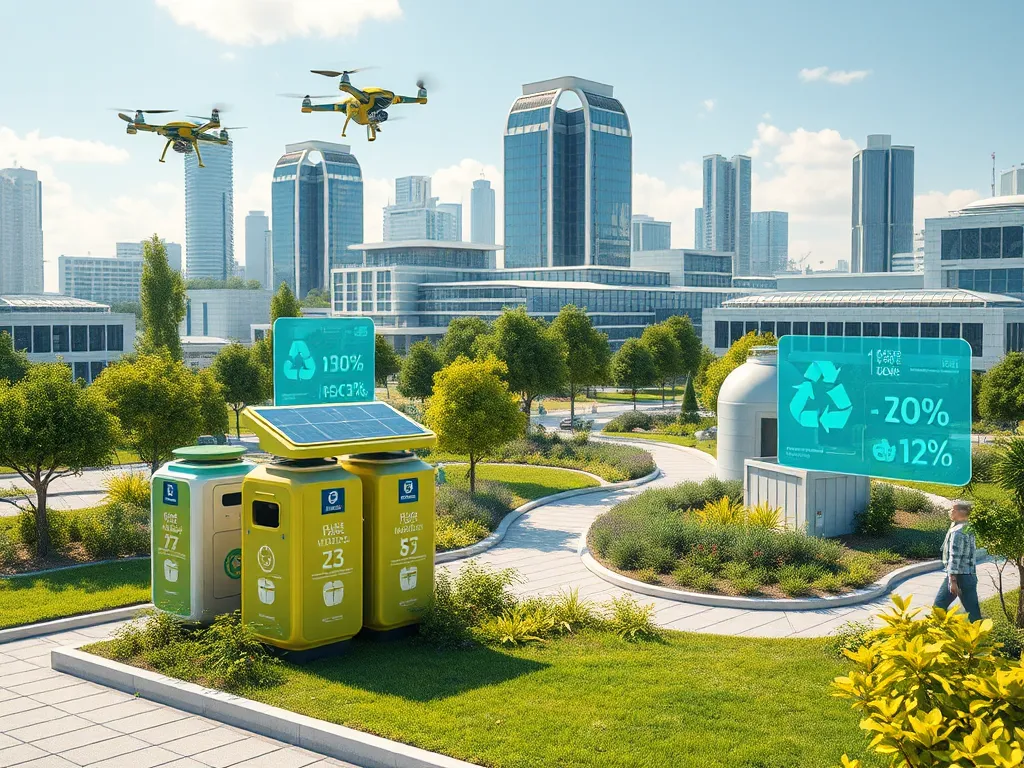Innovative Trends in Future Waste Management Strategies

Future Waste Management: A Comprehensive Overview
Future waste management is poised to revolutionize the way we handle waste materials, driven by innovative technologies, sustainable practices, and a commitment to reduce environmental impact. As urbanization and consumption continue to rise, the need for efficient waste management solutions becomes increasingly critical. The future of waste management entails integrating new methodologies that focus on maximizing resource recovery, minimizing landfill waste, and fostering a circular economy.
Addressing the challenges of climate change, biodiversity loss, and pollution, future waste management strategies will prioritize sustainability at their core. The collaboration between governments, industries, and communities is essential to creating frameworks that support these initiatives. Moreover, raising awareness about the importance of responsible waste disposal and recycling will empower individuals and businesses to participate actively in creating a cleaner, healthier environment.
Technological advancements will play a pivotal role in reshaping waste management practices in the future. Innovations such as smart waste bins, advanced sorting machines, and waste-to-energy conversion technologies will streamline operations and enhance efficiency. Emerging fields such as artificial intelligence, the Internet of Things (IoT), and robotics will significantly transform the way waste is processed, tracked, and managed, driving the movement towards sustainable waste management.
Additionally, education and public awareness campaigns are vital components of future waste management. Increasing public understanding of the impacts of waste on our environment will encourage responsible behavior and political engagement. By fostering a culture of sustainability and supporting community initiatives, we can enhance the overall effectiveness of waste management practices across various sectors.
The vision for future waste management is one that harmonizes technology and sustainable practices to achieve a zero-waste society. By focusing on resource recovery, innovation, and education, we can build a world in which waste is not seen as an insurmountable problem but rather as an opportunity for change and sustainability.
The recent report by the UN emphasizes the urgent need for sustainable waste management practices globally.
Sustainable Practices in Future Waste Management
Recycling initiatives are fundamental to future waste management. As communities worldwide recognize the importance of reducing landfill waste, recycling programs will become more sophisticated, with improved systems for collecting, sorting, and processing recyclable materials. Enhanced technologies are expected to increase recycling rates by making the process more accessible and efficient for residential and commercial environments.
Composting techniques for organic waste will also gain traction, providing an effective solution to divert food waste from landfills. Community composting programs, vermiculture, and advanced composting systems can help transform organic materials into valuable soil amendments, enriching local ecosystems and supporting sustainable agriculture.
The zero-waste lifestyle practices will promote behavioral change among individuals and businesses alike. Encouraging habits such as refusing single-use plastic, repairing broken items, and choosing products with minimal packaging can contribute to lower waste generation and greater resource efficiency. Future waste management will empower communities to adopt and encourage these sustainable behaviors.
Upcycling will emerge as a valued practice in future waste management, providing creative and practical solutions to mitigate waste. By repurposing materials into valuable items, individuals can reduce disposal, save money, and contribute to a more sustainable economy. The benefits of upcycling will be vital in shifting mindsets about waste and encouraging environmentally conscious practices.
Community engagement will be crucial in fostering sustainable waste practices. Future waste management initiatives will emphasize collaboration among local governments, organizations, and citizens to implement effective waste reduction strategies. Active participation can lead to innovative solutions tailored to the specific needs and challenges of each community, reinforcing the importance of collective responsibility in waste management.
Technological Innovations in Future Waste Management
Smart waste management systems will revolutionize waste collection and processing. By utilizing smart bins equipped with sensors to monitor waste levels, municipalities can optimize collection routes, reduce operational costs, and minimize carbon emissions associated with waste transport. These systems will leverage data analytics to improve efficiency in waste management practices.
The application of IoT in waste tracking will enable real-time monitoring of waste disposal patterns, recycling rates, and landfill usage. By harnessing data, organizations can make informed decisions to enhance waste management strategies, identify areas for improvement, and proactively address waste-related challenges before they escalate.
Automation and robotics will play a significant role in waste processing, improving sorting accuracy and operational efficiency in recycling facilities. Advanced robotic systems will handle different materials faster than human workers, reducing contamination rates and maximizing the recovery of valuable resources from waste.
Advanced sorting technologies will facilitate the separation of recyclables, organics, and waste at the source or during processing facilities. These innovations will improve the recovery rates of materials, significantly reducing the amount of waste sent to landfills. As sorting technologies continue to evolve, recycling operations will become more efficient and environmentally friendly.
Waste-to-energy conversion technologies will help address the growing waste problem while generating clean energy. By converting non-recyclable waste into energy through processes like incineration or anaerobic digestion, communities can reduce their reliance on fossil fuels, minimize landfill usage, and contribute to a more sustainable energy future.
Policy and Regulation in Future Waste Management
The impact of legislation on future waste management will be vital. Governments will need to implement comprehensive policies that promote waste reduction, recycling, and organic waste diversion. Regulations requiring manufacturers to design products with end-of-life considerations will foster commitment to sustainability across industries.
International waste management policies will provide a framework for countries to collaborate and share best practices. By establishing global standards for waste management, nations can work together to tackle the challenges of waste, fostering innovation and investment in sustainable solutions that transcend borders.
Local governments will develop strategies for waste reduction tailored to their community's needs. Initiatives such as designated recycling days or composting education programs can proactively engage citizens in sustainable waste practices, demonstrating the potential impact of localized action on reducing waste generation.
Incentives for sustainable waste practices will encourage businesses and communities to adopt environmentally friendly measures. Financial rewards for recycling programs, grants for innovative waste reduction initiatives, and tax benefits for utilizing sustainable materials will drive change and collaborations across various sectors.
The role of public awareness in shaping waste policies cannot be overlooked. Educating communities about the importance of responsible waste practices will empower citizens to make informed choices and advocate for policies that support sustainable waste management solutions.
Circular Economy in Future Waste Management
The principles of a circular economy will become integral to future waste management practices. This model focuses on designing waste out of systems, prioritizing resource recovery, and ensuring that materials remain in circulation as long as possible. By embracing these principles, communities can significantly reduce waste generation and environmental impact.
Designing products for recycling and sustainability will redefine industries. Manufacturers will need to consider the entire lifecycle of their products to minimize waste and enhance resource recovery. This approach will lead to the creation of more durable, repairable, and recyclable goods, fostering a shift away from the traditional linear economy.
Business models that support circular waste practices will be crucial for fostering a sustainable economy. Companies adopting practices like leasing, sharing, or take-back programs will help reduce waste generation while providing consumers with sustainable options. These models will create a paradigm shift in how we think about ownership and consumption.
Successful circular initiatives will serve as case studies for future waste management practices. By examining projects that have effectively reduced waste and maximized resource recovery, stakeholders can identify best practices and replicate successful strategies in new contexts.
Consumer behavior will play a foundational role in shaping the circular economy. By making conscious purchasing decisions and championing sustainable products, consumers can push businesses towards adopting environmentally responsible practices. A collaborative approach will be essential to drive the shift towards a circular economy and enhance waste management practices.
Education and Awareness in Future Waste Management
Educational programs targeting future waste management will empower individuals to make informed decisions about waste disposal and recycling. Schools and community organizations will play a pivotal role in imparting knowledge about waste issues, sustainability practices, and the importance of individual responsibility.
The role of schools in waste awareness is particularly significant. Educational institutions can instill values of sustainability in young learners, providing hands-on experiences with recycling, composting, and sustainable consumption. Integrating waste management education into curricula will foster a generation of environmentally aware citizens.
Community workshops on sustainable waste practices can engage citizens directly, providing them with practical knowledge and skills to minimize waste. By sharing success stories and best practices, these workshops can inspire individuals to take proactive steps in their own lives, promoting a culture of sustainability.
The impact of social media on waste behavior will continue to grow. Social media platforms can be powerful tools for raising awareness, sharing success stories, and mobilizing communities around waste management initiatives. Through influencer partnerships and targeted campaigns, organizations can leverage the power of social media to reach broader audiences.
Engagement strategies for public participation will be critical in future waste management efforts. By actively involving communities in decision-making processes, local governments and organizations can foster a sense of ownership and responsibility towards waste practices. Initiatives that encourage citizen feedback can lead to more effective interventions and build a culture of sustainability.
